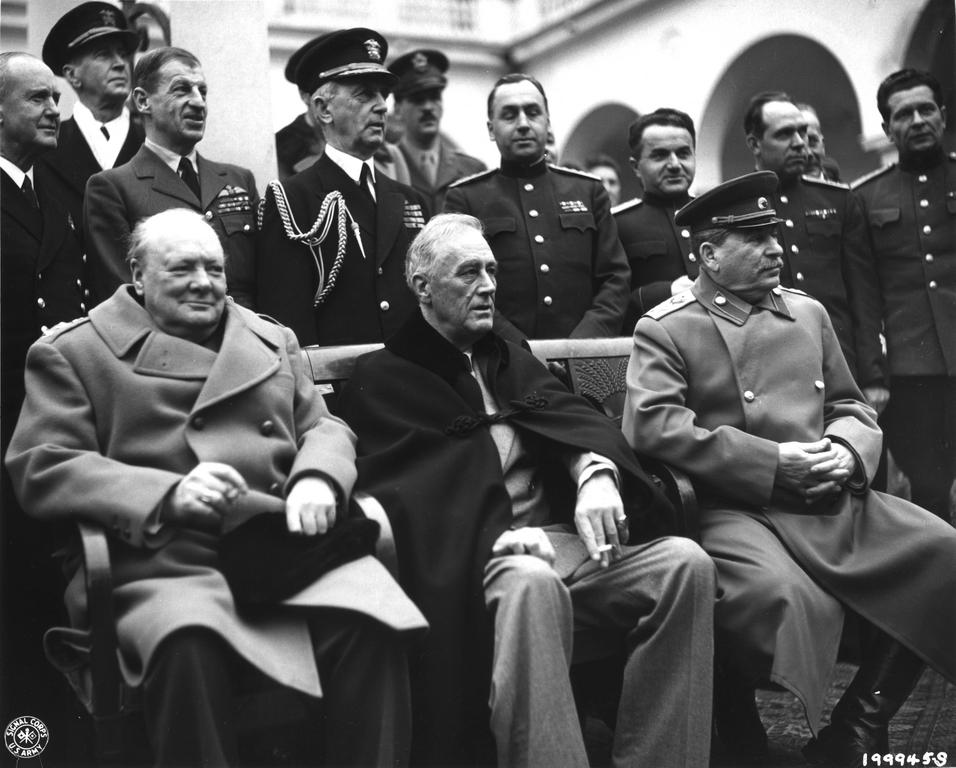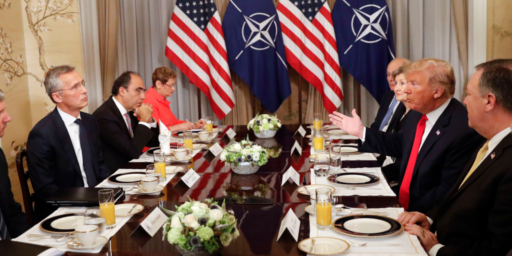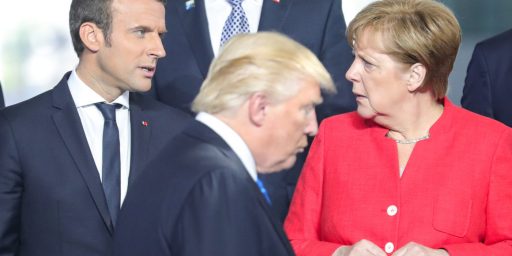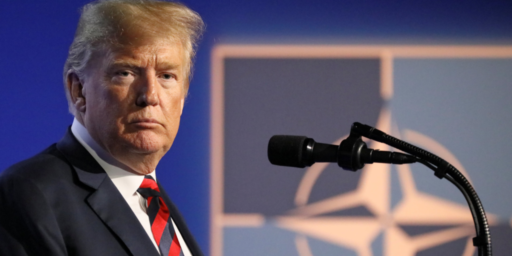Collapse of the Global Elite?
Elliot Cohen laments the lack of steel in the spine of the statesmen, diplomats, soldiers, and thinkers of the current generation.
Elliot Cohen contends we are “Witnessing the Collapse of the Global Elite.” His jumping-off point is a Munich Security Conference in which an ailing John McCain is not leading the American delegation for the first time in years and where H.R. McMaster and other top US officials say the right words but few believe they matter with Donald J. Trump at the helm.
At events like the Munich Conference, it is no coincidence that the word “networking” has largely replaced the word “debate” among global elites. Most of the faces in attendance you could see at other, similar gatherings, like the World Economic Forum in Davos. You could sense the same frenetic socializing among those more eager to be seen than to make a point, more likely to ponderously recite conventional wisdom than to doggedly defend a point of view. When the Polish prime minister declared that Jews were also perpetrators of the Holocaust, there were mere tut-tuts in response. It is a far cry from the Wehrkunde founded by Kleist. His successor is a bland former German diplomat who greets everyone—free citizen or dictator’s henchman—as a long-time friend of the conference, to be cherished for that reason alone, rather than for what he or she says or believes.
What has happened here is the same phenomenon that explains so many of the ills of the last couple of decades: the algae-like bloom of elites and their simultaneous loss of substance. A younger John McCain would not have been unique for his qualities of wisdom and character at the earlier iterations of this conference. He would have been met by acute thinkers like Thérèse Delpech of France, staunch public servants like Manfred Wörner, a German defense minister and secretary general of NATO in the 1980s, or politicians like Dennis Healey of Britain. Their successors are cautious functionaries, pallid experts, and colorless politicians who think carefully about domestic audiences before speaking up abroad.
This political entropy seems to be a near-universal phenomenon in the Western world; why this is so is unclear, and probably has many explanations. But the nicely tailored generation represented in Munich this year seemed baffled by the re-entry into history of today’s authoritarians and fanatics. One wonders whether the attendees possess the steel of the earlier generation that took part in World War II, and in the subsequent struggle with Communism. Attempted Russian subversion of democratic elections in the United States and Europe elicited concern from some at the conference, but few were willing to call for a punitive response sufficient to inflict real pain on Moscow. Meanwhile, Russian oligarchs happily hobnobbed with Europeans looking to do business on the side.
Perhaps this is the inevitable price of the success of the West in creating societies prosperous beyond the dreams of 100 years ago. Perhaps it is the result of a culture that admires military courage but only from a safe distance, that makes democratic political life such a course of humiliation that few sane people will endure it, that has replaced intellectual brilliance with a Henry Ford-style industrialization of the life of the mind. Whatever it is, it hung over the conference like the February fog rising from the city’s slushy streets. This was not the Munich of Neville Chamberlain, but it was surely a long, long way from that of Ewald von Kleist, too.
Partly, I think, this is a function of “elite” having long since become a bad word. Foreign policy was once a thing done by experts to whom the masses deferred; that hasn’t been the case in quite some time. It’s also a function of larger trends that have shaped politics in the West in recent decades—the rise first of 24/7/365 news networks and soon by partisan and social media. The upshot of all that is that we no longer have campaign season, followed by a honeymoon and getting down to the business of governance and compromise. It’s all campaigning, all the time now.
More importantly, as Cohen acknowledges, the Werkunde consensus was not the historical norm. It was forged because the fecklessness of an earlier generation allowed Adolf Hitler to invade and occupy several neighboring states before taking action. World War II forced reluctant allies to work together for a common purpose. The incredibly high cost in blood and treasure of that war—and the impending and then actual Cold War with the Soviets—essentially forced North American and Western European leaders to continue cooperating.
That project ended with the Cold War. NATO leaders struggled valiantly to substitute another. Initially, we had the Yugoslav wars and the immediate challenge of what to do with about the collapse of the Soviet empire. But building a “Europe, whole, free, and at peace” was always an ephemeral goal and the commonality was mostly observed in the breach. Still, cold warriors like George H.W. Bush and Helmut Kohl were in place to lead.
The 9/11 attacks yielded NATO’s first invocation of Article 5, the vow that an attack on one member of the Alliance would be treated as an attack on all. But that was squandered by Bush the Younger who, not unreasonably after the trials of the Kosovo campaign, believed the support of under-funded European militaries wasn’t worth the cost of added bureaucracy and endless whinging. In hindsight, though, that was incredibly short-sighted.
The US remains a global superpower that, even under Trump, had declared in its security and military strategies that Russia and China are its top priorities. But the European allies aren’t Pacific powers and there’s not much consensus in Donald Rumsfeld’s Old Europe about what to do about Russia. Until Putin and company move out of the “gray zone” of provocation short of war, that is likely to remain the case.







I suspect this is a bit of projection. The reality is that the Republican geopolitical elite are completely gone. The Dems still have some serious thinkers in this area. The Europeans for decades have looked to the US for leadership but with Republicans in complete control of the government and Trump as leader, that has completely collapsed.
But the Chinese are very definitely experts in this area. And they are busy altering the landscape substantially in their favor. So a more accurate headline would be “Global Leadership Moves East”.
@MarkedMan:
There are still many people on the right side of the political spectrum that are considered influential on foreign policy issues. Pretty much all of them are Trump critics and would likely never be part of Trump Administration.
I don’t get this contribution. I don’t recall a golden age of Platonic philosopher-kings ruling over the West. The Cold War ended well, but this may have been due to outright failures and incompetence by Soviet leaders such as Brezhnev rather than any brilliance by the engineers of the war in Vietnam. Our policies after the Cold War consisted largely of accommodation of OPEC where in my view we significantly underplayed our efforts to develop non petroleum based energy sources. I don’t want to be harsh about Mr. McCain, but it is hard for me to think of him as an intellectual “elite.” Didn’t he want to fight Russia over South Ossetia? I will agree that having Jared Kushner on the world stage does suggest that we must be hitting some kind of a bottom.
Foreign policy was once a thing done by experts to whom the masses deferred
Would those be the same “experts” who gave us WWI and WWII? Vietnam? The Bay of Pigs? The invasion of Iraq? The killing fields of Cambodia? The failure to do anything about the Rwandan genocide? Europe’s total inability to deal with a Serbian butcher in its own backyard? And that’s just off the top of my not-terribly-historically-knowledgeable head.
A problem that has plagued Mankind forever is that your blessed “experts” have never been as smart as you or they think they are. One of the things that bedevil us now is that actual elites, people who have genuinely achieved something intellectually or materially, are swamped by hordes of the elite-adjacent: people who have neither thought nor done anything of particular significance yet became part of a congealed ruling class because they attended certain schools, pursued certain professions, run in certain social circles, or profess certain opinions.
All of which might be manageable, if not for the fact that NONE of them (elite and elite-adjacent alike) are ever held accountable for anything.
The real issue that Cohen is fumbling around is that the people he’s writing about are apparatchiks in a global order that is coming to an end. They didn’t build the order, they inherited it and they understand it about as well as those old “cargo cults” understood aeronautics.
Mike
@MBunge:
This from the guy that thinks Trump is playing 10 dimensional chess.
But you support sexual assualt, child molestation, and the attack on the US by Russia, so what else should we expect?
@Doug Mataconis: Are you talking about pundits like Larison? If so, I agree. But I can’t think of any Republican in the government who has any kind of skill or insight. Can you?
Back in the Gingrich era there was a Republican Chair of the Foreign Relations Committee (I think that was his committee but can’t recall the name) who took it as a point of pride that he didn’t have a passport as he had never been out of the country. That turned out to be predictive. When the Republicans gave themselves over to the billionaire hobbyists, radio talk show hosts and the Fox News Fantasy World, actual knowledge became a liability, whether it be in Foreign Policy, Domestic Policy, or Science. It’s easier to regurgitate nonsense when you are ignorant, than to know better and simply lie.
@Daryl’s other brother Darryl:
I’m waiting for when Trump is clearly guilty of money-laundering, tax evasion, obstruction of justice and treason to hear the Bung defend that. There’s no bottom to the Bung barrel.
@michael reynolds:
Trump isnt right about much, but he was spot-on when he said he could shoot some one of 5th avenue and his base wouldn’t care.
Bunge would be right here, screaming “butwhatabout…”
@MarkedMan: There are good conservative thinkers, they just aren’t welcome in any Republican controlled government. Andrew Bacevich and Lawrence Wilkerson come to mind.
I read that Cohen article and paused to think… You know the only time that Europe has had an extended period of freedom from general war (please note distinctions!) was during the post-Napoleon period of the Congress of Vienna. For a full century Europeans had to content themselves with killing each other in small wars or wander the globe searching for glory. Elites did that. If given the voice of the common man in present ‘populist’ leadership like Edogan or Victor Orban or Putin or Trump, and given ‘elites’ like those who ‘managed’ Europe peacefully for 100 years, I’d take the elites.
Fortunately that is not the choice. But still.
@Doug Mataconis:
Are these right-side-spectrum thinkers influential in Democratic circles? Because if not, one wonders whom they are influencing in order to be considered influential, given they alienate the President with personal criticism and wouldn’t deign to be in his administration. Their choices have consigned them to 16 years of shouting at the wind. I’m sure they’ll write good papers for the archives. To be in the game, you have to be on a team, even one you don’t like.
I don’t recall who first said it about the U. S. years ago, but there’s a lot of truth to saying our problem is that we have the worst rich people in the world. (Really in history.)
I’ve quoted Eisenhower’s 1954 letter to his brother Edgar in these threads before, but it seems apt.
They are still stupid, but their numbers are now legion. For every Tom Steyer or George Soros backing Dems, how many Adelsons, Kochs, Friesses, Huntsman Sr.s, Mariotts, Mercers, etc. are there? And many of them do not believe in democracy, they see democracy as nothing more than losers trying to take their stuff. They see Putin’s oligarchy as a model.
Read Piketty, Capital in the Twenty First Century. The world wars wiped out huge amounts of wealth and reduced the relative political power of capital and after WWII allowed thirty years of democracy and prosperity. Worldwide we are returning to the status quo ante, the Gilded Age. We talk about a “meritocracy”. Whatever reality there was to it, influence is passing to the wealthy. Whatever faults our supposed “elites” have now, it’s going to get worse.
@Daryl’s other brother Darryl: This from the guy that thinks Trump is playing 10 dimensional chess.
But you support sexual assualt, child molestation, and the attack on the US by Russia, so what else should we expect?
From the guy who specializes in purely ad hominem attacks, what else should we expect?
And I see you haven’t learned from the last time I spanked you. “Sexual assualt (sic), child molestation” — just who are these assailants? When were they convicted of these terrible crimes you speak of?
And I’m sure it’s escaped your notice (quite deliberately, I’m sure), but Trump just oversaw the death of “dozens” if not “scores” of Russians in Syria — who were there because Obama essentially tried to give Russia unfettered access to the Middle East.
That didn’t happen in a vacuum.
There is a general term for the situation where the most powerful and educated members of society devote themselves to personal pleasures and security, rather than the public good. That term is ‘decadence’. History teaches us well what its fruits are.